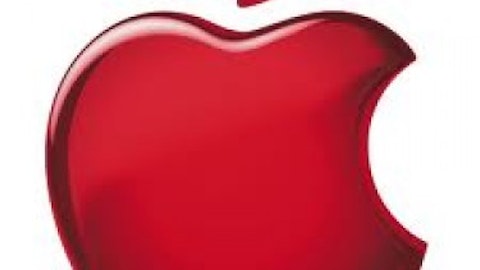After identifying the most popular stocks among hedge funds (see our top 10 here) according to their third quarter 13F filings, we have decided to break down the top ten stocks that hedge funds love in the retail industry. These companies all operate brick-and-mortar stores across various industries, from discount retailers, home improvement stores to specialty. Our list includes the hundreds of hedge funds and prominent investors that are required by the SEC to disclose their public equity holdings quarterly. In descending order, we have outlined the most-loved retail stocks based on the aggregate number of funds owning each.
Dollar Tree, Inc. (NASDAQ:DLTR) is in a three-way tie for eighth with 35 filers after a net increase of 8 filers owning the stock last quarter. Dollar Tree trades fairly low on a P/E basis at 17x, compared to Family Dollar and Dollar General at 19x. With expected same store sales growth of 3% in 2014 and 3.5% in 2013, this retailer should continue to post solid revenue totals amid a strengthening economy. This will be driven in part by the addition of various frozen food and consumable goods to the company’s product base.
Home Depot, Inc. (NYSE:HD) was another one of the three stocks with 35 filers. Home Depot trades in line with its top peer Lowe’s – third on our list – on a P/E and dividend yield basis, but Home Depot has a 60% premium on a P/S basis. Even if Lowe’s might be a better value play, we see both companies benefiting from the ongoing Hurricane Sandy cleanup. Home Depot is still one of billionaire Richard Chilton’s favorite investments (see all of Chilton’s top picks here).
Staples, Inc. (NASDAQ:SPLS) saw a net increase of 5 filers and was the final company with 35 filers. Staples has been beaten down 15% year to date after a large 2Q EPS miss and lowered 2012 guidance. Even with an incalculable trailing P/E, the retailer’s forward P/E of 8x suggests the poor performance was only temporary. One bright spot for the office supply company is its solid dividend that yields 3.7%. For the three quarters of 2012, Staples’s dividend payout has been less than 30% of free cash flow.
Best Buy Co., Inc. (NYSE:BBY) saw a net increase of 10 filers, now with 36 filers, allowing the company to fill the seventh position on our list. The struggling electronics retailer is down over 45% year to date as the likes of Amazon continue to steal market share from brick-and-mortar retailers. Following a recent selloff due to a 75% miss on 3Q EPS Best Buy’s dividend now yields 5.5%. Despite the retailer’s large presence, we would be cautious and consider it a value trap. Best Buy’s cash position has dwindled over 90% from 3Q last year. Interestingly, it is still a major piece of billionaire Jeff Vinik’s portfolio (see all of Vinik’s picks here).
The TJX Companies, Inc. (NYSE:TJX) had 36 filers, making it the sixth most popular retail stock. This apparel company pays a mediocre dividend at a 1% yield and trades in line with peers at a 19x P/E. Part of what has been drawing fund interest is the retailer’s ability to consistently beat earnings and outperform. With a PEG of 1.5, investors still appear to be over discounting the stock.
Target Corporation (NYSE:TGT), the fifth most popular retail stock among hedge funds had 37 filers owning at the end of the third quarter. Target trades closely with our 2nd place retailer loved by hedge funds, Wal-Mart, on several metrics. Both retailers trade with a 14x P/E and a 2.3% dividend yield. Target’s forward P/E is 13x, suggesting investors have not fully accounted for its ability to grow EPS via fresh produce and store refitting operations. The retailer recently sold off its credit card segment, which will allow it to focus more directly on merchandise and retailing.
Macy’s, Inc. (NYSE:M) called 40 filers as owners at the end of the third quarter, and came in at fourth on our list. This specialty retailer is up over 20% year to date and has weathered the economic slowdown better than others, but still trades at only 12.5x earnings. Other major peers include Nordstrom trading at 17x and Dillard’s at 14x. Macy’s appears to offer investors serious value, having a PEG of only 1.0 and a dividend yield of 2.0%.
Lowe’s Companies, Inc. (NYSE:LOW) saw a net decrease of 10 filers, now down to 42, but the stock still holds the third place on our list. Lowe’s has underperformed its top competitor Home Depot by more than 20 percentage points this year, but it’s expected to grow earnings annually over the next five years at 15%, compared to the industry average of 12%.
Wal-Mart Stores, Inc. (NYSE:WMT) stayed consistent from 2Q with 46 filers and came in second place. Compared to Target, Wal-Mart investors experience much less volatility. Wal-Mart has a beta of 0.3, while Target is at 0.9, but both are relatively in line on stock performance year to date. We see Wal-Mart as a better buy given its vast geographical diversification and initiatives to foster growth going forward.
Dollar General Corp. (NYSE:DG) had 50 filers, up from 43 at the end of 2Q, making it our number one retail stock in the hedge fund industry. Both Dollar General and eighth-ranked Dollar Tree have some of the best growth prospects in the discount retailer space, as each is expected to grow earnings at over 17% annually over the next five years. This puts both stocks’ PEG ratios below 1.0 and makes these retailers solid value plays. Part of what makes Dollar General the top retailer, compared to Dollar Tree, is its renewed commitment for store growth. Dollar General’s recent admission to the S&P 500 index will also further broaden its investor base. Dollar General is one of Eton Capital’s top picks (check out all of Eton’s bullish bets here).






